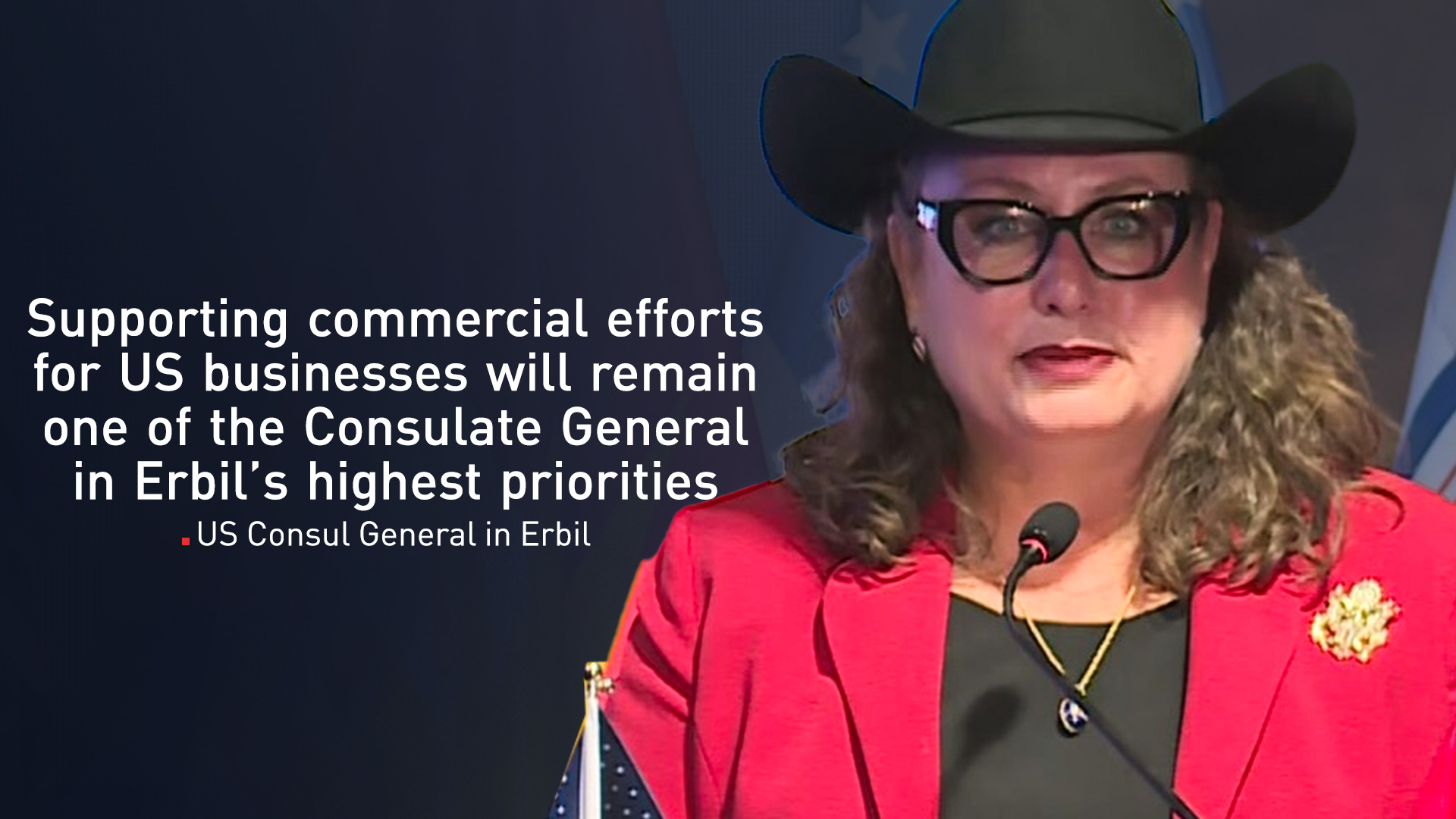US Consul General Highlights Growing Economic Ties at Erbil Trade Conference
The Consul General described the trade delegation’s visit as “monumental” and a clear statement about the future of US-Kurdistan Region relations.

ERBIL (Kurdistan24) – The U.S. Consul General in Erbil, Wendy Green, delivered a keynote speech at a joint conference organized by the American Chamber of Commerce Kurdistan Region of Iraq and the Kurdistan Federation of Chambers of Commerce and Industry, emphasizing Washington’s commitment to strengthening economic partnerships with the Kurdistan Region.
The Consul General described the trade delegation’s visit as “monumental” and a clear statement about the future of US-Kurdistan Region relations. She extended her appreciation to the US Chamber of Commerce and the US Department of Commerce for their role in recognizing and supporting the initiative, noting that their efforts underscored America’s dedication to expanding commercial ties in the region.
Addressing the delegates, Green praised their enthusiasm for exploring new markets and forging business connections in the Kurdistan Region. “By exploring new markets and connecting with potential partners, you’re building bridges between our two countries,” she said, adding that the strong turnout from both government and industry highlighted the “deep and enduring connection” between the United States and the Kurdistan Region.
The Consul General underlined the region’s appetite for American investment and products, encouraging businesses to seize opportunities. “This dynamic region is hungry for US investment and products. You are well-positioned to make the connections that can meet that demand,” she noted.
She also reaffirmed Washington’s strategy to support US businesses abroad by ensuring fair competition and transparent partnerships. “Supporting these commercial efforts and ensuring fair partnerships for US businesses will remain one of the Consulate General in Erbil’s highest priorities,” Wendy stressed.
Acknowledging challenges in the business climate, including issues related to customs, tariffs, and fiscal transparency, she assured delegates that the US Consulate would continue to work closely with officials in both the Kurdistan Region and Iraq to create a more favorable environment for investment.
The Consul General concluded her remarks by expressing optimism about the outcomes of the trade mission, encouraging delegates to share their success stories and return to invest further in the region.
At a different event on Monday, the U.S. Consul General in Erbil reaffirmed Washington’s commitment to expand trade and investment relations with the Kurdistan Region, stressing that future cooperation should increasingly focus on the economic sector rather than solely on security.
The relationship between the Kurdistan Region and the United States has deep roots, shaped by decades of political, security, and humanitarian engagement. Since the 1991 Gulf War, when U.S.-led coalition forces enforced a no-fly zone to protect Kurdish civilians from Saddam Hussein’s regime, Washington has played a central role in the region’s security and political trajectory.
The establishment of the Kurdistan Regional Government in 1992 coincided with a period of close U.S. support for Kurdish autonomy within Iraq.
Following the 2003 U.S.-led Freedom Operation of Iraq, Kurdish forces, the Peshmerga, emerged as vital American allies in stabilizing northern Iraq. This partnership deepened during the war against ISIS (2014–2017), when U.S. military support was crucial in enabling the Peshmerga to hold back and eventually defeat the extremist group alongside coalition forces.
Beyond security, however, economic cooperation has become an increasingly important pillar of bilateral ties. American companies, particularly in the oil and gas sector, have invested heavily in the Kurdistan Region, seeing it as a gateway to broader opportunities in Iraq and the Middle East.
U.S. officials, meanwhile, have repeatedly encouraged the Kurdistan Regional Government (KRG) to diversify its economy beyond hydrocarbons, citing potential in areas such as agriculture, education, health, and digital technology.
The U.S. has also supported governance reforms, institution-building, and private-sector development in the Kurdistan Region, aiming to help create a stable and business-friendly environment. While political disputes between Erbil and Baghdad have sometimes complicated the investment climate, Washington has often acted as a mediator, encouraging compromise and long-term cooperation.
For many Kurdish leaders, strengthening ties with the U.S. represents not only an economic opportunity but also a strategic safeguard amid regional instability and shifting alliances.
Monday’s conference in Erbil reflects this evolving vision: moving from a relationship defined primarily by military and political cooperation toward one grounded in sustainable economic partnership.